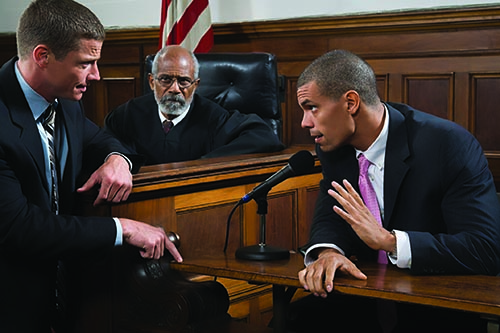 For over
three decades until the time of his death in 1988, Hartford native Edward Bennett Williams was
the most famous lawyer in America. Although greatly celebrated,
For over
three decades until the time of his death in 1988, Hartford native Edward Bennett Williams was
the most famous lawyer in America. Although greatly celebrated,
he does not belong on a legal pedestal; he was no cause lawyer, and would often quip, he would
defend “anyone who’d
pay his fee.” William’s remains important, however, for at least two reasons.
First, he was an effective advocate for civil liberties in the course of protecting the rights of the criminally accused. William’s was instrumental in exposing the misuse of police power in the 1950’s and 1960’s, most notably by a corrupt FBI engaged in wiretaps, break-ins, illegal surveillance and multiple other unlawful activities.
Secondly, and equally important, was Williams’ elevation of the criminal defense bar at a time when criminal lawyers were held in contempt. As a founder of the National Association of Criminal Defense Lawyers, and by the enormous skill and dedication he displayed in defense of citizens in big trouble, he made being a criminal defense lawyer what it is supposed to be: a profession dedicated, as he put it, to the “defense of liberty” on behalf of the “unpopular.”
No one practiced the trial lawyer’s art with greater skill and deep understanding of what works with a jury. His cross-examinations of key witnesses in marquee cases are still quoted from and copied by young lawyers today. William’s 1960 defense of the famously unapologetic civil rights activist, Baptist preacher, and United States Congressman, Adam Clayton Powell, shows a cross- examination so compelling that even his own guilty client was persuaded of his innocence. The trial is recounted in Evan Thomas’ preeminent biography of Williams, entitled The Man to See. From the book:
They called him “Mr. Jesus.” The congregation would weep and
shout “Amen” through the sermons of Adam Clayton Powell, Jr., the charismatic
pastor of Harlem’s Abyssinian Baptist Church. Powell had inherited Abyssinian’s
pulpit from his father, who had suffered a nervous breakdown in 1936. The elder reverend
Powell dealt in real estate
as well as religion, and Adam’s mother had been an illegitimate heiress of
the Schaefer Brewing Company. The Powells vacationed in Bar Harbor, Maine, a summer oasis of
the rich. When Adam heard his call to the ministry, his mother sent him on a
chauffeur-driven tour of the Holy Land . . .
On cross-examination, Williams set about demolishing Robson’s main witness, IRS agent Morris Emanuel. The government’s case against Powell had been sloppily prepared, and Williams used the transcript of the grand jury proceedings to catch Emanuel in a series of contradictions. Emanuel had given the wrong figure on Powell’s earnings to the grand jury.
“You don’t stand by its accuracy, Mr. Emanuel, do you?” Williams asked in a soft voice as he paced back and forth before the witness.
“At that time, yes, at this time, no,” answered Emanuel.
So, said Williams, “what you told the grand jury was inaccurate?”
“As of today, not as of 1958,” said Emanuel, shifting in his chair. “Do you mean the facts themselves were different in 1958 that they are now, or that you were mistaken about the facts then?” Williams inquired, allowing a slight edge to creep into his voice . . .”
“No, I mean and you know the facts were the same . . .”
Williams cut in: “Then the grand jury did not have the benefit of a complete and accurate investigation by you. Is that right?”
Squirming, Emanuel replied, “You make that sound a little difficult, Mr. Williams.”
Judge Bryan glared at Emanuel and snapped, “All right, that is a question and it deserves an answer, Mr. Emanuel. Did it or did it not?”
Emanuel wiped his forehead. “I received whatever information our investigation had developed up to that point.”
Williams closed in: “And you know now, do you not, Mr. Emanuel, on April Fool’s day 1960, that was not accurate information?”
“That is correct,” admitted the witness.
Williams finished him off, “ You were wrong, weren’t you?”
Thoroughly defeated, Emanuel answered, “I was wrong in a lot of things at that time.”
A murmur swept through the courtroom; Bryan had to gavel for order.
At the counsel’s table, Powell turned to look at columnist Murray Kempton, who was sitting in the row behind him. Powell had a look of “utter amazement” on his face, Kempton recalled, “He was shocked to find he was innocent.”
Out of the corner of his eye, Williams had been watching the clock. He knew Bryan wanted to adjourn for the weekend at noon. As the clock struck twelve, Williams ran his hand through his wavy hair and turned to walk to his seat. “I have no further questions,” he declared, not even trying to conceal the triumph in his voice. As he left the courtroom, Powell joked, “They better adjourn this case. I’m making more money every day.”
From The Man to See, by Evan Thomas, Published by Simon and Schuster.
© Spinella Law. All right reserved